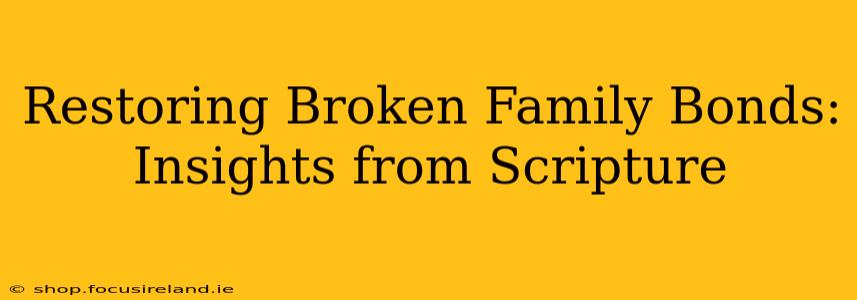Family. The word itself evokes powerful emotions – love, joy, security, but also pain, conflict, and heartbreak. Broken family relationships are unfortunately a common experience, leaving deep wounds and lasting scars. But hope remains. The Bible, filled with stories of fractured families and miraculous restorations, offers profound insights and guidance for healing and rebuilding those broken bonds. This exploration delves into biblical wisdom to illuminate the path toward reconciliation and renewed family harmony.
What Does the Bible Say About Family Reconciliation?
The Bible emphasizes the importance of family unity, repeatedly urging forgiveness, love, and understanding. While it doesn't offer a magic formula for instant reconciliation, it provides principles to guide the process. Key themes include:
-
Forgiveness: This is paramount. Holding onto resentment and bitterness only prolongs the pain. Scripture repeatedly highlights God's boundless forgiveness as a model for our own interactions. (Ephesians 4:32, Matthew 6:14-15) Forgiving doesn't mean condoning harmful actions, but it releases you from the burden of anger and allows for healing.
-
Humility: Pride often fuels conflict. Approaching reconciliation requires humility—acknowledging our own flaws and seeking to understand the other person's perspective. (James 4:6, 1 Peter 5:5) This might involve admitting wrongdoing, even if the other party was also at fault.
-
Love: Unconditional love is the foundation of strong families. 1 Corinthians 13 beautifully outlines the characteristics of love, offering a blueprint for healthy relationships. (1 Corinthians 13:4-7) Love is patient, kind, and forgiving. It doesn't seek its own interests, and it endures all things.
-
Communication: Open and honest communication is crucial. This often requires vulnerable conversations, expressing feelings and needs without resorting to blame or accusations. (Proverbs 15:1, Ephesians 4:15) Active listening is as essential as speaking.
How Can I Repair a Broken Relationship with My Family?
This is a deeply personal journey, unique to each family dynamic. However, some practical steps inspired by biblical principles can facilitate the process:
1. Prayer and Seeking God's Guidance:
Begin by praying for guidance and strength. Ask God to help you understand your role in the conflict and grant you the wisdom to approach reconciliation with humility and love. (Philippians 4:6-7) Consider seeking spiritual counsel from a pastor or trusted mentor.
2. Taking the First Step:
Often, reconciliation requires someone to take the initiative. This might involve a phone call, a letter, or a simple visit. Express your desire to heal the rift and your willingness to forgive. (Romans 12:18)
3. Focusing on Actions, Not Just Words:
Genuine reconciliation requires more than just words; it demands consistent, loving actions. This could involve offering help, spending quality time together, or simply showing kindness and respect.
4. Setting Healthy Boundaries:
Reconciliation doesn't mean ignoring past hurts or allowing harmful behavior to continue. Setting healthy boundaries protects your well-being while still striving for peace.
5. Seeking Professional Help:
If the situation is complex or deeply rooted in trauma, seeking professional help from a therapist or counselor can be invaluable.
What if My Family Doesn't Want to Reconcile?
This is heartbreaking but a possibility. While you can't force reconciliation, you can continue to extend forgiveness and love. (Matthew 5:44) Your actions may speak louder than words, eventually softening hearts. Remember to prioritize your own emotional and spiritual well-being throughout this process.
Does the Bible Offer Examples of Family Reconciliation?
Yes! The Bible is replete with examples of families overcoming conflict and experiencing restoration. The story of Joseph and his brothers (Genesis 45) is a powerful illustration of forgiveness and reconciliation. Despite years of betrayal and hardship, Joseph forgave his brothers, ultimately restoring their family bond.
How Can I Forgive Someone Who Has Hurt Me Deeply?
Forgiveness is not a feeling; it's a choice. It's a conscious decision to release the bitterness and resentment, allowing healing to begin. It doesn't mean forgetting or minimizing the hurt, but it releases you from the burden of anger. (Colossians 3:13) Pray for the person who hurt you, and focus on God's love and grace in your own life.
Restoring broken family bonds is a challenging but rewarding journey. By applying the principles of forgiveness, humility, love, and communication found in Scripture, along with prayer and seeking support when needed, it is possible to experience healing and renewed relationships. The path may be difficult, but the promise of restoration offers profound hope.

